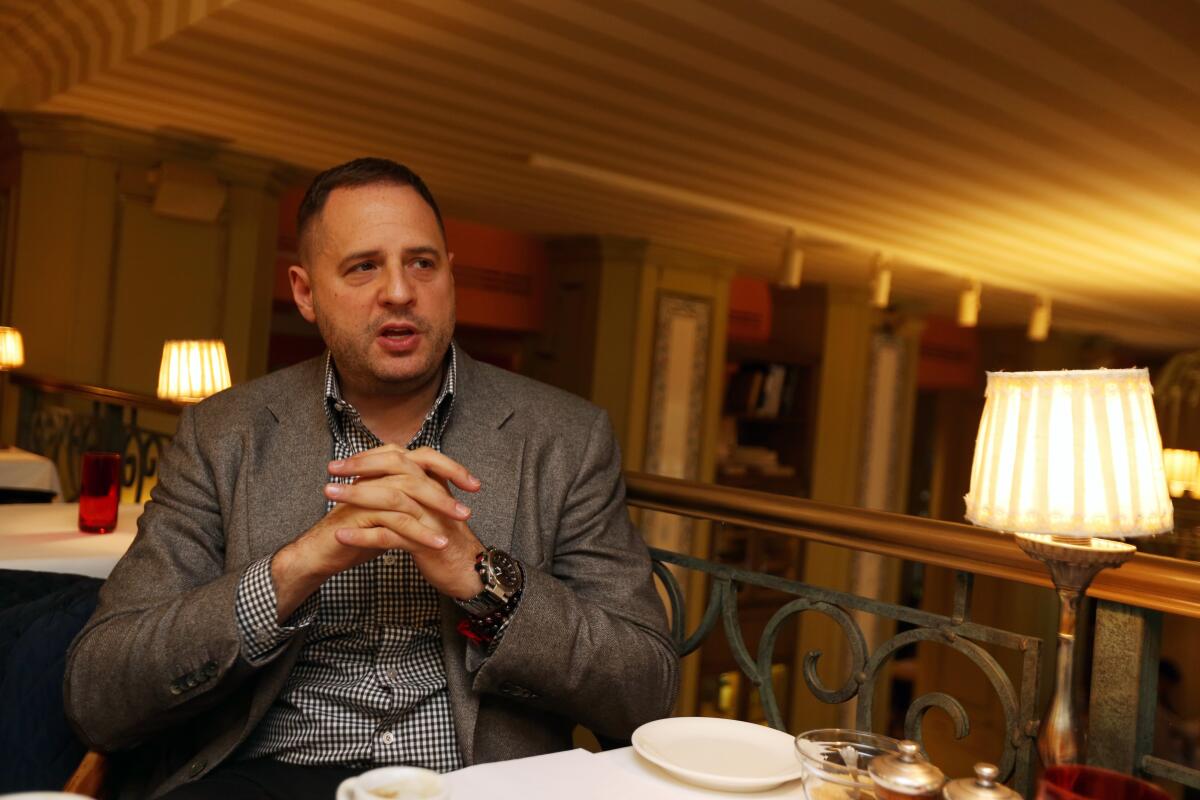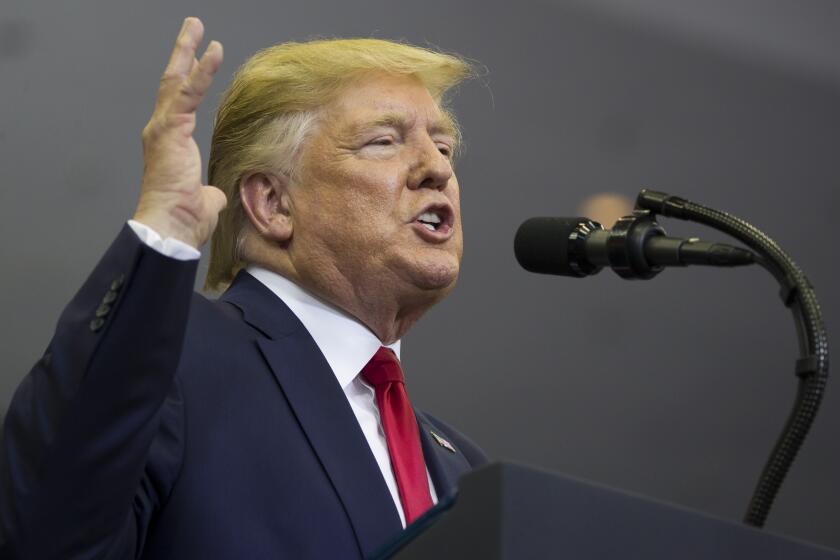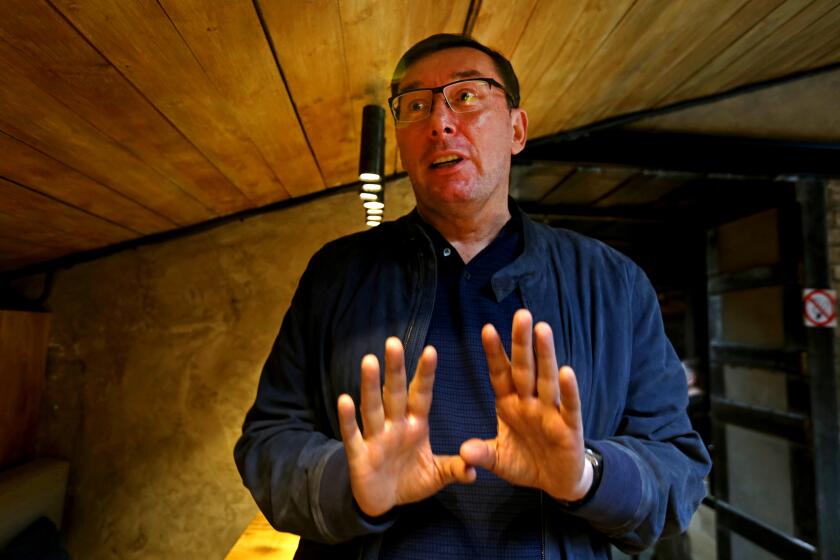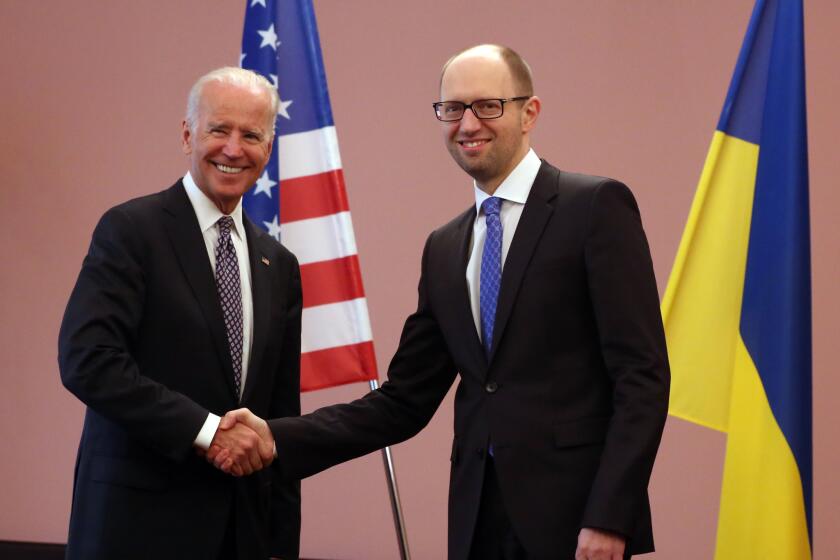Ukrainian official: We tried to correct Trump’s ‘negative impression’

KYIV, Ukraine — U.S. political leaders peddled ill-informed accounts about the situation in Ukraine, a top advisor to Ukraine’s president said in his first interview with a U.S. news outlet. Although he stressed that he did not believe the falsehoods ever threatened U.S.-Ukrainian relations, the accounts may have given President Trump cover for suspending military aid.
“The fact is that some American politicians were not informed in the right degree about what is going on here,” Andriy Yermak said Saturday in an interview with the Los Angeles Times.
“This is both our problem and their problem,” said Yermak, who is a top advisor and longtime friend of Ukrainian President Volodymyr Zelensky.
“Clearly, over the years,” he added, “President Trump had developed a negative impression of Ukraine, which was not what we wanted.”
Yermak said he spent weeks this summer attempting to reassure U.S. officials that the United States had no enemies in the Ukrainian leadership, even before he learned of U.S. officials’ decision to suspend a military aid package to Ukraine, and was dismayed that the country had been dragged into Washington’s political fights and Trump’s possible impeachment.
Yermak chose his words carefully to avoid overt criticism of Trump advisors. He clearly communicated a sense of hope that what some view as damage to Ukraine, which has depended on U.S. and European help against Russia, would be temporary.
Yermak was asked if he could trust the U.S. under Trump after all that had transpired in recent weeks, and a lengthy pause followed.
“We are pragmatic,” he said.
Second whistleblower emerges in Trump impeachment inquiry, said to be one of ‘multiple’ complainants
Whistleblower knows firsthand about Trump’s dealings with Ukraine, lawyer says. Another member of legal team cites “multiple” whistleblower clients.
Ukraine’s relations with the United States have been favorable in the decades since it left the Soviet Union, turned to the West and stood up as a bulwark against Russia. The U.S. has provided military assistance that has helped Kyiv in its continued battle with Russia-backed groups that are trying to carve away parts of eastern Ukraine.
The hostile treatment by the Trump administration unnerved Zelensky’s government, which came into office in May and is still finding its footing.
Yermak has served as point man for connecting Zelensky with Trump through Trump’s personal lawyer, Rudolph W. Giuliani, whom Yermak met and spoke with several times in the months after Zelensky took office in the spring.
Yermak said he had no role in a July 25 telephone call between Trump and Zelensky that is now at the center of the impeachment inquiry. He said he wished that the contents of the call had remained private.
On the call, when Zelensky asked about military aid, Trump responded, “I would like you to do us a favor though,” according to the account of the call released by the White House. He went on to press the Ukrainian leader to look at unsubstantiated allegations against former Vice President Joe Biden and his son as well as other false claims about Ukrainian involvement in the 2016 U.S. presidential campaign.
Those comments reflected allegations being promoted by Giuliani and fed by a former Ukrainian general prosecutor, Yuri Lutsenko.
Lutsenko suggested to Giuliani and others that there was evidence to suggest Ukrainian meddling in the 2016 election and illicit enrichment by the Bidens. He never supplied evidence and recently recanted the claims.
Ukraine’s former top prosecutor says he repeatedly rebuffed Rudolph Giuliani’s demands to investigate Joe Biden and son because he had no evidence of wrongdoing.
Determined to reverse the tide of Kyiv becoming isolated, Yermak exchanged text messages with U.S. diplomats from July through September aimed at setting up a meeting between Trump and Zelensky.
Some of the texts with Yermak and among the U.S. diplomats were released publicly by the House Intelligence Committee late Thursday. In them, U.S. officials pressed for a public commitment from Zelensky to open investigations into Biden and others.
“I think potus really wants the deliverable,” one of the diplomats wrote, using the acronym for president of the United States.
“I think it’s crazy to withhold security assistance for help with a political campaign,” wrote another of the diplomats, Bill Taylor, who was serving as the acting head of the U.S. Embassy in Kyiv.
Several days after the July 25 phone call between the two presidents, Kurt Volker, the administration’s special envoy to Ukraine, urged Yermak to draft a public statement that Zelensky could release to secure a White House meeting.
“Once we have a date” for a Trump-Zelensky meeting “we call a press briefing, announcing upcoming visit and outlining vision for the reboot of US-Ukraine relationship, including among other things Burisma and election meddling investigations,” Yermak wrote in response. Burisma is a gas company on whose board Biden’s son Hunter served.
“Sounds great!” Volker replied.
Volker resigned as envoy after he was named in the impeachment inquiry. He gave a deposition to the House Intelligence Committee last week in which he provided the text messages.
Pressure, meanwhile, was coming from other administration officials throughout the summer.
Zelensky and Yermak met with Trump’s former national security advisor, John Bolton, in Kyiv on Aug. 26; with Vice President Mike Pence in Warsaw on Aug. 31; and with Energy Secretary Rick Perry in mid-May. In all the meetings, the U.S. officials pressed the Ukrainians on corruption investigations, and the Ukrainians sought answers about why aid had been suspended. It is unclear whether Biden’s name specifically came up during those sessions.
In the interview, Yermak echoed Zelensky in saying Kyiv would resist outside pressure but added that much of what was being demanded of them, such as fighting corruption and reviewing past judicial cases, were things they would have done anyway.
He expressed dismay that Giuliani and other U.S. officials appeared to be woefully ignorant of Ukraine, basing their estimations on what he contended was the earlier government of Petro Poroshenko, which made advances in judicial reform but also faced corruption allegations.
“It is not a secret for us that the true information about Ukraine and U.S.-Ukraine relations left much to be desired,” he said.
Joe Biden made at least half a dozen visits to Ukraine when he was vice president. Here’s what he was doing.
After several telephone calls with Giuliani, which were arranged by Volker, Yermak met the former New York mayor in Madrid in early August. Giuliani had recently said in television appearances that the new Ukrainian government led by Zelensky was full of “enemies of America.”
Ukrainian officials were stunned by that characterization. Yermak said he felt he had to speak to the lawyer personally both to dispel that notion and open a path to seeing Trump.
“I understood this was not an anybody, this was an opinion maker,” he said of Giuliani.
Yermak says one of the government’s priorities now is to repair relations both with Washington and European capitals. The White House memorandum of the July 25 call quoted Zelensky as criticizing European leaders as he sought to flatter Trump.
Support from France and Germany are critical as Ukraine tries to negotiate an end to the war with the Russia-backed separatists.
After the call with Zelensky, Trump did release the nearly $400-million military aid package, and Yermak says his government has received assurances it will continue to flow.
“I think this amount should be even bigger,” he said.
Special correspondent Sergei L. Loiko in Kyiv contributed to this report.
More to Read
Get the L.A. Times Politics newsletter
Deeply reported insights into legislation, politics and policy from Sacramento, Washington and beyond. In your inbox three times per week.
You may occasionally receive promotional content from the Los Angeles Times.














